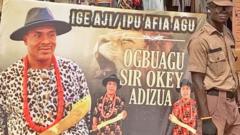Ken Okoroafor, who finally received his 'Leopard Slayer' title at 60, exemplifies the inextricable link between personal ambition and cultural heritage. The once necessary act of hunting leopards has transitioned to modern symbolic gestures, due to conservation efforts as leopards became endangered. Instead, a financial equivalent is presented to maintain the community's ritual.
Mr. Okoroafor, despite having spent decades in the US, is drawn back to his roots where the society's influence carries weight. Candidates partake in a detailed three-step process, with public ceremonies drawing in families and communities from near and far, particularly during festive seasons.
Symbolism remains strong as initiates are adorned with honors, receiving unique swords and ceremonial garments that elevate their status among peers. However, not all are accepted; the stringent criteria ensure that only qualifying individuals join the ranks of Ogbuagu, reflecting a blend of tradition and evolving societal values.
Calls for inclusivity within the society challenge remnants of traditional hierarchies, as descendants of former slaves are now seeking recognition. And while the celebrations bolster local economies, some voices in the community question the expenditures and urge a focus on broader developmental initiatives.
Regardless of the criticisms, the Igbuu Society finds its strength in unity, historical reverence, and ongoing connection among Osbgugu members worldwide, proving that the essence of Oguta continues to thrive even in a modern context.
Adaobi Tricia Nwaubani brings this rich narrative to life, illustrating the depth of desire, celebration, and tradition present in the heart of Oguta, Nigeria.
Mr. Okoroafor, despite having spent decades in the US, is drawn back to his roots where the society's influence carries weight. Candidates partake in a detailed three-step process, with public ceremonies drawing in families and communities from near and far, particularly during festive seasons.
Symbolism remains strong as initiates are adorned with honors, receiving unique swords and ceremonial garments that elevate their status among peers. However, not all are accepted; the stringent criteria ensure that only qualifying individuals join the ranks of Ogbuagu, reflecting a blend of tradition and evolving societal values.
Calls for inclusivity within the society challenge remnants of traditional hierarchies, as descendants of former slaves are now seeking recognition. And while the celebrations bolster local economies, some voices in the community question the expenditures and urge a focus on broader developmental initiatives.
Regardless of the criticisms, the Igbuu Society finds its strength in unity, historical reverence, and ongoing connection among Osbgugu members worldwide, proving that the essence of Oguta continues to thrive even in a modern context.
Adaobi Tricia Nwaubani brings this rich narrative to life, illustrating the depth of desire, celebration, and tradition present in the heart of Oguta, Nigeria.





















